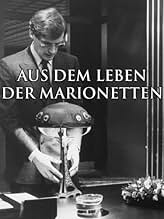AVALIAÇÃO DA IMDb
7,2/10
5 mil
SUA AVALIAÇÃO
Adicionar um enredo no seu idiomaAn account of the events before and after a murder committed by a disturbed businessman in a strained marriage, and what led him to perform such a shocking act.An account of the events before and after a murder committed by a disturbed businessman in a strained marriage, and what led him to perform such a shocking act.An account of the events before and after a murder committed by a disturbed businessman in a strained marriage, and what led him to perform such a shocking act.
- Prêmios
- 1 vitória no total
Paul Bürks
- The Assistant in the fashion show
- (não creditado)
Avaliações em destaque
A short comment - enjoyed this and it is up to the usual Bergmann standards. As with many of his other films sticking with some of the difficult opening scenes rewards the viewer later with a thought provoking account of one man's depression leading to violence and murder. In many ways Bergman is the jacques costeau of the film world, exploring the deep seas and bringing up to the surface what lies below!
Bergman was on top form writing this piece - there's lots to think about. What motivates a respectable man, whose mental state indicates only a small risk of self-harm, to undertake such a violent and frenzied crime? Do the ulterior motives and actions of those around him (wife, shrink, wife's business partner...)deliberately or unwittingly trigger the crime - or indeed are those sub-plots entirely incidental to the central event? These questions are not answered - they are raised and illuminated.
This is not Bergman's greatest piece of cinema - the mixture of documentary, drama and flashback can be a little disorienting - but the argument of the film drives on relentlessly and it is compulsive watching. Well worth seeing.
This is not Bergman's greatest piece of cinema - the mixture of documentary, drama and flashback can be a little disorienting - but the argument of the film drives on relentlessly and it is compulsive watching. Well worth seeing.
Pros:
1. The movie begins with an eye-catching opening which is simultaneously tense, suspenseful, and unflinchingly brutal. It also serves as an intriguing view into the main character.
2. The flashbacks are presented with a black-and-white colour palette, which is just a nice and simple way of delineating them from the present.
3. Both Robert Atzorn (Peter Egermann) and Christine Buchegger (Katarina Egermann) deliver fantastic performances.
4. The film serves as a fascinating insight into the mind of a psychopath who also happens to be suffering from marriage and sex issues.
5. The cinematography, especially in regards to the framing of the shots, is sharp and concise.
Cons: 1. The sound design is a little off at times. 2. The continuous sex, and sex-related content, starts to get a little repetitive. 3. The movie, at times, feels too pretentious which pulls the viewer out of the immersion.
Cons: 1. The sound design is a little off at times. 2. The continuous sex, and sex-related content, starts to get a little repetitive. 3. The movie, at times, feels too pretentious which pulls the viewer out of the immersion.
Bergman made this film in Germany, while in exile from Sweden for tax-related reasons. It's a dark and disturbing psychological portrait of a man, Peter, who murders a prostitute in the opening scene. The film moves back and forth in time, using title cards to establish the setting in time, trying to explain Peter's troubles. It's reminiscent of Scenes from a Marriage, as Peter has problems relating to his wife, Katarina. A few weeks before the murder, he started having fantasies and dreams about murdering her. The prologue, depicting the murder (or, more precisely, the moments before the murder) and the epilogue (Peter in prison) are filmed in color, but everything else is in black and white. The composition is generally not showy, but there is an amazingly filmed dream sequence, the film's centerpiece. The script is generally brilliant, very observant. The only thing I felt was a little underdeveloped was the homosexual character, Tim, and Peter's supposed latent homosexuality, which the psychoanalyst character describes near the end. I wasn't quite sure what to make of that material. 9/10.
A complex dissection of a murder and a murderer, told by jumping back and forth in time, before and after the event, A deeply disturbing portrait of a man and a society so cut off from feeling that violence seems almost inevitable.
While more divided in public reaction then some of Bergman's most beloved works, I think this edgy, bold, uncomfortable film ranks close to some of his best work. While there are moments of pretension, there's also a lot of human and psychological complexity (and wonderful acting) in this bleak exploration of how near murder and madness lie to any of us.
While more divided in public reaction then some of Bergman's most beloved works, I think this edgy, bold, uncomfortable film ranks close to some of his best work. While there are moments of pretension, there's also a lot of human and psychological complexity (and wonderful acting) in this bleak exploration of how near murder and madness lie to any of us.
Você sabia?
- CuriosidadesDa Vida das Marionetes (1980) is Director Ingmar Bergman's only movie shot in the German language. O Ovo da Serpente (1977) was shot in Germany, too, but mostly in English.
- ConexõesFeatured in Drugoe Kino: From the Life of the Marionettes (2006)
- Trilhas sonorasTouch Me, Take Me
Performed by Rita Wright
Principais escolhas
Faça login para avaliar e ver a lista de recomendações personalizadas
Detalhes
- Data de lançamento
- Países de origem
- Idioma
- Também conhecido como
- From the Life of the Marionettes
- Locações de filme
- Empresas de produção
- Consulte mais créditos da empresa na IMDbPro
Bilheteria
- Faturamento bruto mundial
- US$ 4.293
- Tempo de duração
- 1 h 44 min(104 min)
- Cor
- Mixagem de som
Contribua para esta página
Sugerir uma alteração ou adicionar conteúdo ausente






























